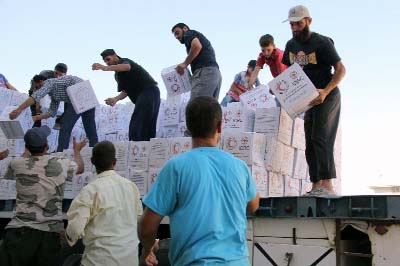
AFP, Paris :While grain silos in many Western countries may overflow this winter, tens of millions of people risk going without food as hunger is being used more than ever as a weapon of war.More than 50 million people living in 17 conflict-ridden countries are in “severe food insecurity”, two UN agencies warned recently.The protracted conflicts in Yemen and Syria place those two nations at the top of the list established by the Food and Agriculture Organization (FAO) and the World Food Programme (WFP).In Yemen, 14 million people – over half the population – are now considered to be facing a food crisis or emergency.Meanwhile in Syria, 8.7 million people or 37 percent of the pre-conflict population, “need urgent food, nutrition and livelihoods assistance”, in particular aid to farmers, said the agencies.The same goes for parts of northeastern Nigeria, which has borne the brunt of an insurgency by Boko Haram islamists since 2009, and where the aid group Doctors Without Borders estimates half a million people face a humanitarian catastrophe.Thousands of hungry people forced from their homes by fighting there had to wait until the end of July to receive their first food aid.Meanwhile, most of the world’s top wheat producers are enjoying bumper crops, pushing prices down on global commodity markets and benefiting countries like Egypt that are dependent upon imports.But for countries gripped by conflict, importing food is logistically difficult if not impossible and at prices out of the reach of most of the population which have lost their livelihoods.Maintaining local agricultural production, even traditional small-scale farms, thus often becomes critically important for reducing hunger while helping keep down the number of refugees, said the head of the FAO’s emergency unit, Dominique Burgeon.”It is clear that agriculture plays an important role in the resilience of populations faced with the shock of war,” he told AFP in a telephone interview.In certain parts of Syria this year people who have been displaced from other regions are helping till the fields and take in the harvest.Even so, that hasn’t saved the agricultural sector, on which four-fifths of the rural population depends, from collapse.”In Syria, all the industrial chicken farms have been destroyed, which affects the poorest people as chicken was the most affordable source of protein,” said Burgeon.The FAO estimates that only 1.9 million tonnes of wheat will be harvested this year in Syria, less than half of the 4 million tonnes it produced before the war.Nevertheless, it has had difficulties in persuading donor nations to reach into their pockets to fund purchases of seeds, fertilisers and tools for Syrian farmers.”We want to show the impact of food security on the stabilisation of the population,” said Burgeon, expressing his disappointment that the appeal for $86 million of funds has so far received only a tenth of that sum.

